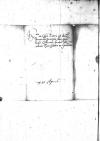List #1296
Mauritius FERBER do Ioannes DANTISCUSHeilsberg (Lidzbark), 1535-04-11
| odebrano [1535]-04-15 Rękopiśmienne podstawy źródłowe:
Pomocnicze podstawy źródłowe:
Publikacje:
| ||||||||||
Tekst + aparat krytyczny + komentarz Zwykły tekst Tekst + komentarz Tekst + aparat krytyczny Ekscerpty dotyczące podróży Dantyszka
 AAWO, AB, D. 8, f. 1vunnafter45
AAWO, AB, D. 8, f. 1vunnafter45
Reverendissimo in Christo Patri et Domino, domino
Reverendissime in Christo Pater et Domine, domine frater et amice carissime ac honoran(de) or honoran(dissime)⌈honoran(de)honoran(de) or honoran(dissime)⌉.
Quid serenissima regia maiestas in negotio duodecim milium florenorum Renensium pro serenissimo
Ad eam autem rem bene ac concorditer conficiendam hoc imprimis necessarium est, quod Reverendissima Dominatio Vestra eum diem, quo vel ipsa, vel per ipsam deputandi, Marienburgi constitui velint et possint illustrissimo domino Prussiae duci etc. significet, quatenus et serenissimi regis Daniae designati procurator pro eodem ibi compareat, huiusmodi  AAWO, AB, D. 8, f. 45v pecuniam percepturus ac recognitionum et obligationum litteras iuxta serenissimae regiae maiestatis descriptionem atque exemplaria nuper Marienburgi dictata et serenissimae maiestati eius transmissa, depositurus. Nam id Reverendissimam Dominationem Vestram ita facturam ac hunc eundem diem, quo ea tota res extradendae pecuniae Marienburgi transigi debet illustritati eius significaturam, in responso, quod illi dedi, rescripsi. Neque hoc consilium meum Reverendissimae Dominationi Vestrae cum (secus commode fieri nequeat) displiciturum confido. Libenter in his omnibus et temporum necessitati et illustritati eius, imprimis autem serenissimae regiae maiestatis voluntati ac ordinationi obtemperaturus, si modo per adversam valetudinem mihi liceret.
AAWO, AB, D. 8, f. 45v pecuniam percepturus ac recognitionum et obligationum litteras iuxta serenissimae regiae maiestatis descriptionem atque exemplaria nuper Marienburgi dictata et serenissimae maiestati eius transmissa, depositurus. Nam id Reverendissimam Dominationem Vestram ita facturam ac hunc eundem diem, quo ea tota res extradendae pecuniae Marienburgi transigi debet illustritati eius significaturam, in responso, quod illi dedi, rescripsi. Neque hoc consilium meum Reverendissimae Dominationi Vestrae cum (secus commode fieri nequeat) displiciturum confido. Libenter in his omnibus et temporum necessitati et illustritati eius, imprimis autem serenissimae regiae maiestatis voluntati ac ordinationi obtemperaturus, si modo per adversam valetudinem mihi liceret.
Cum his me Reverendissimae Dominationi Vestrae diligenter commendo, ipsam in plurimos vitae annos salvam, felicem atque optime florentem esse superinscribed, in the hand of sender⌈esseesse superinscribed, in the hand of sender⌉ exoptans.
Dat(ae) or Dat(um)⌈Dat(ae)Dat(ae) or Dat(um)⌉
Reverendissimae Dominationis Vestrae totus


